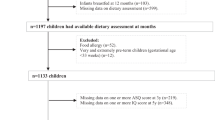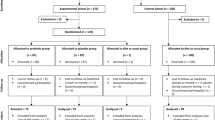Abstract
Background/objectives:
Consumption of oily fish more than once per week has been shown to improve cognitive outcomes in children. However, it is unknown whether similar benefits can be achieved by long-term omega-3 fatty acid supplementation. The objective was to investigate the effect of omega-3 fatty acid supplementation during the first 5 years of life on subsequent academic performance in children by conducting a secondary analysis of the CAPS (Childhood Asthma Prevention Study).
Subjects/methods:
A total of 616 infants with a family history of asthma were randomised to receive tuna fish oil (high in long-chain omega-3 fatty acids, active) or Sunola oil (low in omega-3 fatty acids, control) from the time breastfeeding ceased or at the age of 6 months until the age of 5 years. Academic performance was measured by a nationally standardised assessment of literacy and numeracy (National Assessment Program Literacy and Numeracy (NAPLAN)) in school years 3, 5, 7 and 9. Plasma omega-3 fatty acid levels were measured at regular intervals until 8 years of age. Between-group differences in test scores, adjusted for maternal age, birth weight and maternal education, were estimated using mixed-model regression.
Results:
Among 239 children, there were no significant differences in NAPLAN scores between active and control groups. However, at 8 years, the proportion of omega-3 fatty acid in plasma was positively associated with the NAPLAN score (0.13 s.d. unit increase in score per 1% absolute increase in plasma omega-3 fatty acid (95% CI 0.03, 0.23)).
Conclusions:
Our findings do not support the practice of supplementing omega-3 fatty acids in the diet of young children to improve academic outcomes. Further exploration is needed to understand the association between plasma omega-3 fatty acid levels at 8 years and academic performance.
This is a preview of subscription content, access via your institution
Access options
Subscribe to this journal
Receive 12 print issues and online access
$259.00 per year
only $21.58 per issue
Buy this article
- Purchase on Springer Link
- Instant access to full article PDF
Prices may be subject to local taxes which are calculated during checkout


Similar content being viewed by others
References
Das UN . Long-chain polyunsaturated fatty acids in the growth and development of the brain and memory. Nutrition 2003; 19: 62–65.
Schuchardt JP, Huss M, Stauss-Grabo M, Hahn A . Significance of long-chain polyunsaturated fatty acids (PUFAs) for the development and behaviour of children. Eur J Pediatr 2010; 169: 149–164.
Innis S . Essential fatty acids in growth and development. Prog Lipid Res 1991; 30: 39–103.
Kim J-L, Winkvist A, Aberg M, Aberg N, Sundberg R, Toren K et al. Fish consumption and school grades in Swedish adolescents: a study of the large general population. Acta Paediatr 2009; 99: 72–77.
Zhang J, Hebert JR, Muldoon MF . Dietary fat intake is associated with psychosocial and cognitive functioning of school-aged children in the United States. J Nutr 2005; 135: 1967–1973.
Aberg MA, Aberg N, Brisman J, Sundberg R, Winkvist A, Toren K . Fish intake of Swedish male adolescents is a predictor of cognitive performance. Acta Paediatr 2009; 98, 555–560.
Hibbeln JR, Davis JM, Steer C, Emmett P, Rogers I, Williams C et al. Maternal seafood consumption in pregnancy and neurodevelopmental outcomes in childhood (ALSPAC study): an observational cohort study. Lancet 2007; 369: 578–585.
Richardson AJ, Burton JR, Sewell RP, Spreckelsen TF, Montgomery P . Docosahexaenoic acid for reading, cognition and behaviour in children aged 7-9 years: a randomized controlled trial (the DOLAB study). PLoS One 2012; 7: e43909.
Gale CR, Marriott LD, Martyn CN, Limond J, Inskip HM, Godfrey KM et al. Breastfeeding, the use of docosahexaenoic acid-fortified formulas in infancy and neuropsychological function in childhood. Arch Dis Child 2010; 95: 174–179.
Birch EE, Carlson SE, Hoffman DR, Fitzgerald-Gustafson KM, Fu VL, Drover JR et al. The DIAMOND (DHA Intake And Measurement Of Neural Development) Study: a double-masked, randomized controlled clinical trial of the maturation of infant visual acuity as a function of the dietary level of docosahexaenoic acid. Am J Clin Nutr 2010; 91, 848–859.
Dunstan JA, Simmer K, Dixon G . Cognitive assessment of children at age 21/2 years after maternal fish oil supplementation in pregnancy: a randomised controlled trial. Arch Dis Child Fetal Neonatal Ed 2008; 93: 54–60.
Delgado-Noguera MF, Calvache JA, Bonfill Cosp X . Supplementation with long chain polyunsaturated fatty acids (LCPUFA) to breastfeeding mothers for improving child growth and development. Cochrane Database Syst Rev 2010: CD007901.
Simmer K, Patole S, Rao SC . Longchain polyunsaturated fatty acid supplementation in infants born at term. Cochrane Database Syst Rev 2008: CD000376.
Qawasmi A, Landeros-Weisenberger A, Leckman JF, Bloch MH . Meta-analysis of long-chain polyunsaturated fatty acid supplementation of formula and infant cognition. Pediatrics 2012; 129: 1141.
Kirby A, Woodward A, Jackson S, Wang Y, Crawford MA . A double-blind, placebo-controlled study investigating the effects of omega-3 supplementation in children aged 8-10 years from a mainstream school population. Res Dev Disabil 2010; 31: 718–730.
Nemo Study Group. Effect of a 12-mo micronutrient intervention on learning and memory in well-nourished and marginally nourished school-aged children: 2 parallel, randomized, placebo-controlled studies in Australia and Indonesia. Am J Clin Nutr 2007; 86: 1082–1093.
Muthayya S, Eilander A, Transler C, Thomas T, van der Knapp HCM, Srinivasan K et al. Effect of fortification with multiple micronutrients and n-3 fatty acids on growth and cognitive performance in Indian schoolchildren: the CHAMPION (Children's Health and Mental Performance Influenced by Optimal Nutrition) Study. Am J Clin Nutr 2009; 89: 1755–1775.
de Jong C, Kikkert HK, Fidler V, Hadders-Algra M . Effects of long-chain polyunsaturated fatty acid supplementation of infant formula on cognition and behaviour at 9 years of age. Dev Med Child Neurol 2012; 54: 1102–1108.
Ryan A, Nelson E . Assessing the effect of docosahexaenoic acid on cognitive functions in healthy, preschool children: a randomized, placebo-controlled, double-blind study. Clin Pediatr 2008; 47: 355–362.
Jacobson JL, Jacobson SW, Muckle G, Kaplan-Estrin M, Ayotte P, Dewailley E . Beneficial effects of a polyunsaturated fatty acid on infant development: evidence from the Inuit of Arctic Quebec. J Pediatr 2008; 152: 356–364.
Bakker EC, Ghys AJA, Kester ADM, Vles JS, Dubas JS, Blanco CE et al. Long-chain polyunsaturated fatty acids at birth and cognitive function at 7y of age. Eur J Clin Nutr 2003; 57: 89–95.
Eilander A, Muthayya S, van der Knaap H, Srinivasan K, Thomas T, Kok FJ et al. Undernutrition, fatty acid and micronutrient status in relation to cognitive performance in Indian school children: a cross-sectional study. Br J Nutr 2010; 103, 1056–1064.
Mihrshahi S, Peat J, Webb K, Tovey E, Marks G, Mellis G et al. The Childhood Asthma Prevention Study (CAPS): design and research protocol of a randomized trial for the primary prevention of asthma. Controlled Clin Trials 2001; 22: 333–354.
Toelle BG, Ng KKW, Crisafulli D, Belousova E, Almqvist C, Webb K et al. Eight-year outcomes of the Childhood Asthma Prevention Study. J Allergy Clin Immunol 2010; 126: 388–389. 9.e1-3.
Marks GB, Mihrshahi S, Kemp AS, Tovey ER, Webb K, Almqvist C et al. Prevention of asthma during the first 5 years of life: a randomized controlled trial. J Allergy Clin Immunol 2006; 118: 53–61.
Almqvist C, Garden F, Xuan W, Mihrshahi S, Leeder SR, Oddy WH et al. Omega-3 and omega-6 fatty acid exposure from early life does not affect atopy and asthma at age 5 years. J Allergy Clin Immunol 2007; 119: 1438–1444.
Hoyos C, Almqvist C, Garden F, Xuan W, Oddy WH, Marks GB et al. Effect of omega 3 and omega 6 fatty acid intakes from diet and supplements on plasma fatty acid levels in the first 3 years of life. Asia Pac J Clin Nutr 2008; 17: 552–557.
Australian Curriculum Assessment and Reporting Authority. NAPLAN Achievement in Reading, Persuasive Writing, Language Conventions and Numeracy: National Report for 2012. ACARA: Sydney, 2012. Available from http://www.naplan.edu.au (accessed 1 October 2013).
Shrier I, Platt RW . Reducing bias through directed acyclic graphs. BMC Med Res Methodol 2008; 8: 70.
Lipsitch M, Tchetgen ET, Cohen T . Negative controls: a tool for detecting confounding and bias in observational studies. Epidemiology 2010; 21: 383–388.
Ayer JG, Harmer J, Xuan W, Toelle BG, Webb K, Almqvist C et al. Dietary supplementation with n-3 polyunsaturated fatty acds in early childhood: effects on blood pressure and arterial structure and function at 8y. Am J Clin Nutr 2009; 90: 438–446.
Skilton MR, Ayer J, Harmer J, Webb K, Leeder SR, Marks GB et al. Impaired fetal growth and arterial wall thickening: a randomized trial of omega-3 supplementation. Pediatrics 2012; 129: e698–e703.
Kirby A, Woodward A, Jackson S, Wang Y, Crawford MA . Children's learning and behaviour and the association with cheek cell polyunsaturated fatty acids levels. Res Dev Disabil 2010; 31: 731–742.
Dalton A, Wolmarans P, Witthuln RC, van Stuijvenberg ME, Swanevelder SA, Smuts CM . A randomised control trial in schoolchildren showed improvement in cognitive function after consuming a bread spread, containing fish flour from a marine source. Prostagland Leukot Essent Fatty Acids 2009; 80: 143–149.
He K . Fish, long-chain omega 3 polyunsaturated fatty acids and prevention of cardiovascular disease- eat fish or take fish oil supplement? Prog Cardiovasc Dis 2009; 52: 95–114.
Cheng S, Lyytikainen A, Kroger H, Lamberg-Allardt C, Alen M, Koistinen A et al. Effects of calcium, dairy product, and vitamin D supplementation on bone mass accrual and body composition in 10-12 y-old girls: a 2-y randomized trial. Am J Clin Nutr 2005; 82: 1115–1126.
Acknowledgements
We thank the children and parents of the CAPS cohort, without whose participation this study would have been impossible to perform. Kitty Ng was instrumental in communicating with families, obtaining consents and blood samples over many years. This was not an industry-supported study. Bronwyn Brew is supported by an NHMRC research scholarship (#1038533), Guy Marks by NHMRC Practitioner fellowships (#1003500 & 402827) and the CAPS study by NHMRC Project Grants #974097, #991101, #211081, #352409 and #570919, and the CRC for Asthma. Catarina Almqvist was supported by the Swedish Research Council, the Swedish Heart-Lung foundation and the regional agreement on medical training and clinical research (ALF) between Stockholm County Council and Karolinska Institutet, Stockholm Sweden. Contributions of goods and services were made by Allergopharma Joachim Ganzer KGGermany, John SandsAustralia, Hasbro, TollRefrigerated, AstraZeneca Australia and Nu-Mega Ingredients Pty Ltd. Goods were provided at reduced cost by Auspharm, Allersearch and Goodman Fielder Foods.
Author information
Authors and Affiliations
Consortia
Corresponding author
Ethics declarations
Competing interests
GB Marks sits on an advisory board for Novartis, who pay an honorarium on his behalf. The unit GB Marks works in has conducted the research funded by AstraZeneca. The remaining authors declare no conflict of interest.
Additional information
Supplementary Information accompanies this paper on European Journal of Clinical Nutrition website
Supplementary information
Rights and permissions
About this article
Cite this article
Brew, B., Toelle, B., Webb, K. et al. Omega-3 supplementation during the first 5 years of life and later academic performance: a randomised controlled trial. Eur J Clin Nutr 69, 419–424 (2015). https://doi.org/10.1038/ejcn.2014.155
Received:
Revised:
Accepted:
Published:
Issue Date:
DOI: https://doi.org/10.1038/ejcn.2014.155



